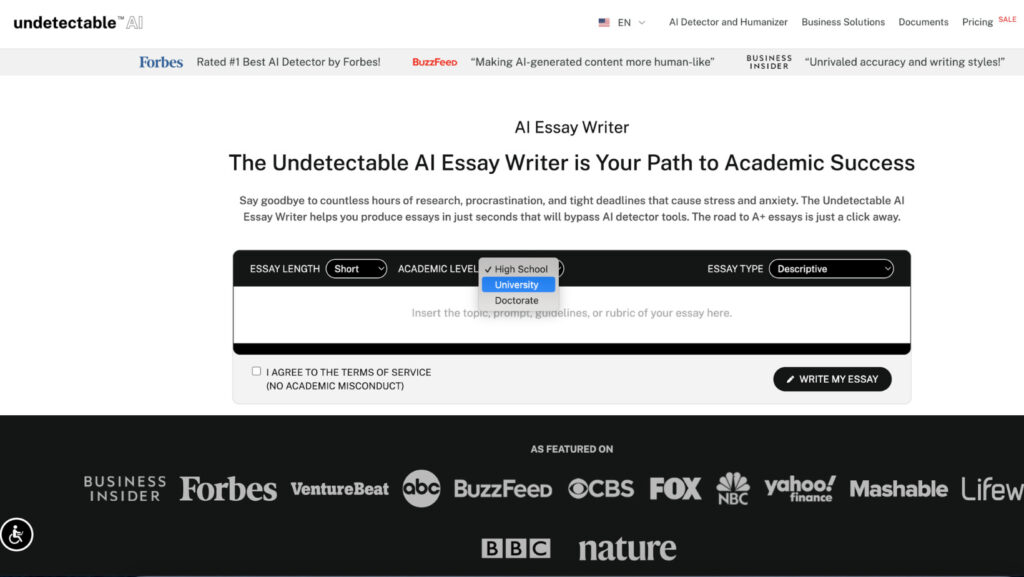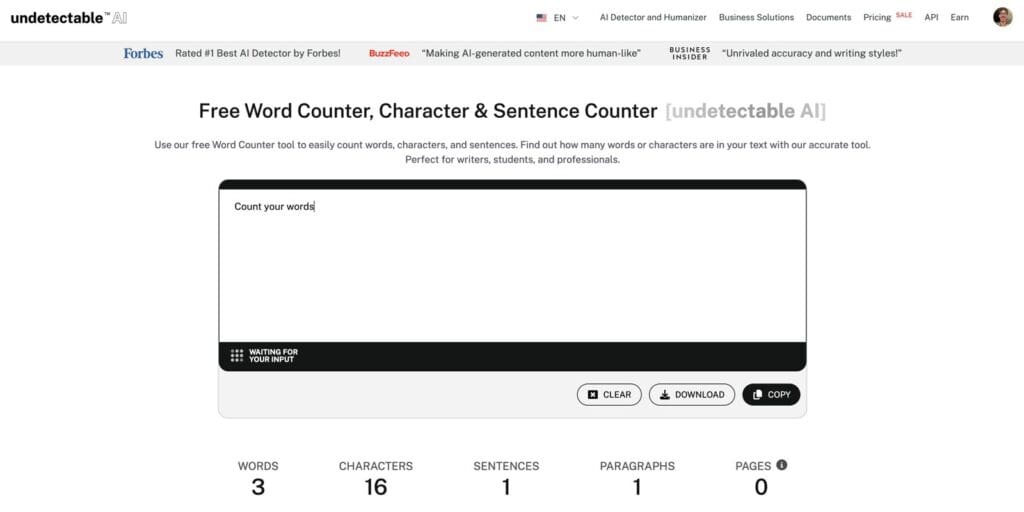Writing long-form essays is often a struggle for most college students.
We all have been in a place where we ran out of things to say, stared at a screen blankly, struggled to meet that word count, and wondered how we’d ever fill the page without resorting to unnecessary fluff.
Low word count often happens when we’re trying to be too concise or don’t break down our ideas enough.
Sometimes, it’s just a matter of not fully expanding on a topic or getting stuck in short, choppy sentences.
Today, I’ll show you how to increase word count of your essay through easy, practical tips that also improve the quality of your writing.
What Is Word Count?
At its simplest, a word count is the total number of words in a document, essay, article, or any written piece.
It is a measuring stick for your writing that helps you and your readers gauge the scope of your work.
The point of a word count is to determine how much detail or complexity you should aim for.
Never Worry About AI Detecting Your Texts Again. Undetectable AI Can Help You:
- Make your AI assisted writing appear human-like.
- Bypass all major AI detection tools with just one click.
- Use AI safely and confidently in school and work.
On any given topic, you could write a quick summary in a few hundred words or explore every single aspect and nuance using thousands of words.
Word counts set expectations for the depth of your writing.
For example, if your assignment is to write a 500-word-long paper on symbolism in To Kill a Mockingbird, you will only focus on one symbol, like the mockingbird itself, and analyze how it’s used.
But if you’re tasked with a 20,000-word-long paper, that’s a whole different ball game.
You’d likely explore multiple symbols throughout the novel and explain their meaning in detail.
Without a word count or page requirement, both assignments sound exactly the same: “Write about symbolism in To Kill a Mockingbird.”
But the finished products of both vary wildly based on differences in the word count.
Common Reasons for Low Word Count
Low word count is often more than just “writing less.”
Here are some common reasons that shrink your word count.
Understand and identify what you struggle with before you learn how to increase word count:
- More Telling, Less Showing: Writers usually default to summarizing actions and emotions instead of immersing readers in them. For example, saying that “She was angry,” can be better described by her clenched fists, her narrowed eyes, or the way her voice cracked with tension.
- Weak Scene-building and sparse descriptions: Descriptions of surroundings and settings are easily glossed over by writers. The environment where two people are conversing is as important as their conversation.
- Not Enough Sensory Details: When scenes are bare of sights, sounds, smells, or textures, they end up becoming too short and also quite boring. Writing like, “The forest was quiet,” misses opportunities to expand on the rustling leaves and creaking branches or the damp scent of moss.
- Lack of interiority: A lack of interiority, where a character’s thoughts and emotions remain unexplored, is another major reason for low word count. Instead of giving readers access to what a character feels or thinks, writers often stick to external actions.
8 Effective Ways to Increase Word Count
Now that we know the common mistakes that lead to a low word count, here are some practical tips that explain how to increase word count and make your essay longer.
1. Add More Examples and Supporting Evidence
Taking a moment to present the other side and then dismantling it with strong reasoning not only expands your word count but also makes your writing more persuasive.
For example, if you’re arguing why a particular policy is beneficial, include a paragraph on why critics disagree and explain why their reasoning is not the best in your opinion.
Such an approach deepens your argument.
Strengthen each sub-argument within your writing with concrete evidence.
If your essay has multiple points, make sure each one is backed by research, statistics, real-world case studies, or detailed examples.
For inspiration, you can use an AI Essay Writer to brainstorm more examples or ideas you hadn’t considered.
More examples and more evidence make for a richer argument (and more words on the page).
2. Break Down Complex Ideas
Break down complex ideas into smaller, more manageable components to increase word count.
It will allow you to explain concepts in greater detail and avoid oversimplifying the material.
Rather than just presenting a broad statement, take the time to dissect the topic.
Elaborate on any processes or systems you describe in your essay.
If you state in your essay, “Cloud computing stores data remotely,” explain, in a few sentences, how it actually works.
Take a few paragraphs to explain the behind-the-scenes such as:
- How data is transferred
- How security protocols protect it
- How users access it through various devices, and so on.
Again, consider how you would be able to present a number of different perspectives on a subject.
For example, in a technical discussion, describe how a particular technology is used in one industry, then contrast this with its application in another.
3. Add Definitions or Explanations
One simple way to make your essay longer is by expanding your content with clear definitions and explanations.
The benefits of an explanation are two-fold:
- It adds depth to your writing
- It helps your readers better understand your topic
For example, let’s say you’re writing about renewable energy.
Instead of simply stating:
“Solar panels convert sunlight into electricity.”
You could elaborate by adding an explanation:
“Solar panels, also known as photovoltaic (PV) cells, convert sunlight into electricity using semiconductor materials. When sunlight hits these cells, it creates an electric field that generates a flow of energy.”
Notice how this version provides more detail.
It introduces a technical term, explains it briefly, and naturally increases the word count.
4. Include Quotes or Expert Opinions
Find a few quotes that are relevant to the point you’re making.
For instance, if your topic is leadership, using Simon Sinek’s quote,
“Leadership is not about being in charge. It is about taking care of those in your charge,”
adds weight to your argument.
Another practical tip is to provide context for the quote.
Instead of dropping it in isolation, include the sentence before or after it from the source if it provides helpful background.
For example, if you reference a speech or study, describing its purpose or relevance gives readers a fuller picture.
You could do the same for expert opinions.
Search for some industry leaders and see what their point of view is regarding your topic.
Explain their reasoning, and you will easily have added an extra couple hundred words.
5. Elaborate With “How” and “Why” Questions
Almost every claim or fact you write is an opportunity to explore cause and effect. “How” and “Why” questions push you to go beyond surface-level statements.
For example, if you write, “Good communication improves team productivity,” think about how communication boosts productivity and why it is needed in a team environment.
Talk about reasons how clear instructions reduce errors or why open communication prevents misunderstandings using real-world evidence.
This technique forces you to clarify your reasoning and fill gaps in your explanation.
Every why digs into motives or reasons behind your statement, while every how expands on process or methods.
6. Add Transition Sentences
Transition sentences hold your writing together and make it flow smoothly from one idea to the next.
Make sure every paragraph begins with a topic sentence that clearly introduces its main idea.
Once you’ve established that, end the paragraph with a transition sentence that ties it back to your argument and sets up the next idea.
If you struggle with writing cohesive transitions, use the AI Stealth Writer to generate natural phrasing to link your thoughts.
7. Expand Your Introduction and Conclusion
Both introduction and conclusion sections give you the room to be more narrative or reflective without requiring heavy technical evidence.
Use this flexibility to engage readers and add valuable words that improve your essay rather than inflate it.
Your introduction should clearly present the thesis, which is the main point of your paper.
Expand this section by adding context or background information to set the stage for your argument.
You can also include a personal anecdote, a surprising fact, some statistics, or a relevant quote to hook the reader’s attention.
In your conclusion, go beyond simply restating the thesis. Remind the reader why the topic of your essay matters by connecting it to broader implications.
Reiterate your key points and add a thoughtful reflection or forward-looking statement to end your discussion.
8. Use Descriptive Language
The tone of your language plays a critical role in how detailed your writing becomes.
As you review your work, adjust the tone to expand on ideas.
Dry, or monotonous writing, apart from being dull to read, often leads to excessively brief content.
For example, instead of writing:
“Birds migrate. Migration happens in winter.”
You could say:
“Many bird species, like geese and swans, migrate thousands of miles during winter to find warmer climates and abundant food sources.”
See how the second version adds descriptive language and introduces more details.
It also uses more words without feeling redundant or padded.
An excellent method to add descriptions is to think of the 5 senses.
Instead of saying, “The garden was beautiful,” you can describe the colors, fragrances, and sounds of the environment.
For example, “The garden burst with vibrant tulips in shades of red and yellow that filled the air with the sweet scent of jasmine and the soft rustling of leaves.”
An AI Paraphraser can help you refine and expand your sentences with sensory details without adding fluff.
Tools to Help You Increase Word Count
Although the above tips answer the question how to increase word count pretty well, AI tools make your work much easier. Here are some tools you must try:
- AI Essay Writer: If you’re struggling with how to make your essay longer, use this tool to expand what you’ve already written following your tone and style. You can customize your request by determining the essay type (descriptive, narrative, persuasive, etc), your academic level (high school, university, doctorate), and essay length.
- AI Paraphraser: This tool takes your existing content and converts it into a more comprehensive version. It adds depth to your essay through extra examples, counterarguments, new perspectives, and more. The readability, purpose, and tone can also be customized according to your needs.
- Word and Character Counter: With this handy tool, you can quickly check the total words count, number of characters, sentences, and more in your essay. Check individual word count for different sections of your essay and spot areas that need more elaboration.
You can also test out our AI Humanizer and Detector in action using the widget below!
Conclusion
You’ll find countless tips floating around online on how to increase word count.
However, it’s important to remember that simply adding fluff or filler won’t do you any favors.
It can get you to the word count, but it won’t improve the quality of your essay.
The strategies we’ve discussed here add meaningful substance to your work and ensure your words serve a purpose.
And yes, AI tools make this process smoother and faster.
So, here’s our last bit of advice: if you’re looking for all the tools we talked about (and a ton more), check out Undetectable AI.
It has everything you need to improve your writing without sacrificing quality for the sake of word count.






